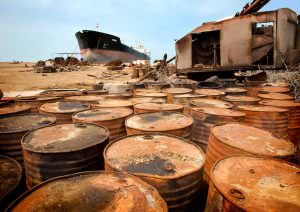As Many Governments Flail, Ordinary Europeans Are Making Extraordinary Gestures to Help Refugees
Immersed in the greatest refugee crisis since World War II, the European Union cannot get it together. But ordinary Europeans are doing amazing things.By Silja J.A. Talvi, AlterNetEditor’s note: This article was originally published on AlterNet.
Helsinki, FINLAND—The gestures have been both grand and unexpected.
This past weekend, the prime minister of Finland, Juha Sipilä, announced that he would provide one of his own luxurious homes for immigrant families to live in for an indefinite period of time. Last week, the director of the Bank of Finland announced that he is donating a month of his annual salary—10,000 euros–to refugee relief efforts through the Finnish Red Cross.
While public gestures like these have been a welcome and unexpected relief in European countries like Finland, which have been beset by anti-immigrant and racist rhetoric in the midst of the greatest refugee crisis since World War II, the true heroes are emerging from the ranks of everyday citizens. In Finland, working class and middle-class families are clearing out extra bedrooms to make room for traumatized refugees. Volunteers are lining up by the thousands at Finnish Red Cross centers across the country to become friends of new immigrants, to help with childcare, to donate clothing, materials, labor, even medical expertise. A campaign is even underway to knit thousands of pairs of wool socks to help prepare an expected 30,000 refugees primarily from Syria, Iraq, Somalia and Eritrea for the freezing winter to come.
Over the weekend, Pope Francis called on every European religious parish, congregation, and monastery to reject xenophobia and to take in at least one migrant family. “Faced with the tragedy of tens of thousands of refugees fleeing death on account of war and hunger, and who are traveling toward a hope for life, the Gospel calls us to be ‘neighbors’ to the smallest and abandoned, (and) to give them a concrete hope,” the Pope announced.
But even before the Pope’s announcement, Helsinki’s Mikael Agricola church had already begun house some of the overflow refugees who could not be squeezed into the country’s limited network of immigrant reception centers.
Finns are, by and large, a highly educated populace. They know that the civil war, disease and hunger that has ravaged Syria has had everything to do with the surplus of weaponry flooded to the military (courtesy of neighboring Russia, with whom Finland had to go to war twice in order to become and retain her independence) and to the factions warring with Assad’s governments (courtesy of the U.S. and her allies, including wealthy Saudi Arabia, which has yet to take in a single Syrian refugee). Over the past four years, nearly 12 million Syrians have been displaced, including the more than 4 million Syrians who have fled their homeland. According to the International Rescue Committee, just slightly over 1,500 Syrian refugees have been resettled in the United States since the relentless civil war began almost five years ago. In other words, a small dent in a crisis for which the U.S. bears enormous responsibility.
For the first few years of the civil war, the vast majority of Syrian refugees were being soaked up by the neighboring countries of Turkey, Jordan and Lebanon, where the population is now fully 20% Syrian.
Then, the trickle of human bodies onto Europe’s shores—not just from Syria but from other war-torn regions of the Middle East and Africa–became a tide. This year, the tide finally turned into a flood.
Initially, amidst a full-fledged economic crisis of its own, Greece was doing its best to handle record-setting numbers of asylum seekers to the European Union. From there, the refugee crisis logically spread outward, most notably in the direction of France, Germany and the United Kingdom, the countries with the biggest existing immigrant populations and the most resources to be able to house and stabilize the lives of those hundreds of thousands of men, women and children fleeing for their lives. Germany is also the country with the most compelling reason to act decisively in this crisis, in light of the fact that the Third Reich was the reason for the European refugee crisis of the last century. Back then, few countries would accept the boatloads of fleeing Jews, political dissidents, and other “undesirables.” Ships were typically turned back—the U.S. was among the many countries that rejected such refugee ships–and the passengers were callously returned to extermination camps.
History has a great deal to do with why German citizens are now so actively opening up their homes to new arrivals, and calling for the government to restrain the violence of neo-nazi factions dead-set on doing whatever they can to stop refugees from being settled in their homeland. Neo-nazis aside, average German residents are volunteering by the droves, coordinating food donations to help nourish famished refugees, who are arriving by the thousands each day by foot, bus and train from neighboring countries–including one of the unsympathetic European nations imaginable, Hungary.It is in Hungary that the ugliest facets of the European Union’s chaotic approach to the greatest refugee crisis since World War II are perhaps most evident. The Hungarian parliament recently introduced emergency anti-migration laws, including three-year jail terms for people attempting to climb over razor wire fences lining the border with Serbia. Hungary has also created stark and militarized “transit zones” to imprison asylum seekers which offer little or no medical assistance food or shelter, outside of what volunteers are able to provide.
Other Central European and Baltic states, including Slovakia, Poland, and Estonia, are similarly callous in their approach to the current refugee crisis, which has already caused an an estimated 350,000 refugees cross into Europe this year. In Estonia, the nation’s only refugee reception center was burned down earlier this month in the town of Vao. Although the 50 residents were able to escape with their lives, they face the reality of seeking asylum in a country so xenophobic that it has flatly refused to be part of the UN Refugee Agency’s relief efforts. Only a few dozen people a year are granted asylum in Estonia.
And while countries like Estonia fret about those few dozen refugees per year, thousands of immigrant deaths have already been attributed to drowning and starvation–even before those human beings ever made it to shore. The majority of European governments and, indeed, many European citizens seemed to care little about the dire situation until a horrifyingly beatific photo was published of a drowned, three-year-old Syrian toddler on a Turkish beach. The striking picture led to a firestorm of protest and grand gestures of political and financial assistance.
Despite Prime Minister Juha Sipilä’s symbolic gesture to hand over his house to arriving refugees, Finland is perhaps the best example of an historically progressive social welfare society that has, in recent years, steered clear of its responsibility to aid refugees and asylum seekers. Finland is the northern most member of the EU, having joined in 1995, with a current population of 5.4 million.
Currently led by a center-right coalition government, Finland has intentionally shirked its responsibility to bear a greater portion of responsibility to aid migrants fleeing persecution and violence. Prime Minister Sipilä, a self-made IT millionaire, forged his coalition alliance earlier this year with the conservative National Coalition Party and the right-wing populist Finns Party.
The Finns Party (renamed from its original moniker as the “True Finns Party”), began its rise to power in 2011 with a euroskeptic and hard-line immigrant stance. Several prominent members are known to have ties to extremist right-wing and neo-nazi groups, but the party has done close to nothing to weed them out.
The Finns Party is now Finland’s second-biggest political party. Over the past four years, the Finns Party has seized on a time of heightened economic insecurity—and a kind of national identity crisis—by scapegoating Finland’s small number of immigrants (and the children of immigrants) as the major source of Finland’s woes. Although the real sources of Finland’s economic downturn are largely attributable to the relative inflexibility of the Finnish market, the rapid downturn of the IT sector and the crushing impact of wide-ranging economic sanctions set against Russia, the party has capitalized on misdirected Finnish outrage.
Rather than criticizing the EU and the U.S. for crushing Finland’s economic backbone–essential trade with neighboring Russia–the Finns Party has dedicated itself to churning out tremendous amounts of print and web propaganda dedicated to demonizing immigrants and refugees, who are typically described as robbing native Finns of hard-earned taxes. On the face of it, the assertions are not only incorrect but outrageously distorted, as Finland remains one of the most ethnically homogenous places in Europe, with only 6 percent of the total national population made up of immigrants and the children of immigrants.
Shortly after taking power earlier this year, Prime Minister Sipilä appointed the anti-abortion and anti-refugee Finns Party chairperson, Timo Soini, to the post of Foreign Minister. The coalition government went straight to work. First, the government decided to reduce the already paltry number of quota refugees from 1,050 to just 750 individuals per year, ignoring the pleas of French and Greek govenrments that EU member nations had to do something to help ease their refugee overload.
To add insult to injury, the coalition government then decided in May to cut time-tested constructive aid to the most needy developing countries by 49 million euros.
The cool irony of all of the efforts to shirk responsibility for the fate of the rest of the world is that no amount of regressive policy making has been able to stop the reality of the European refugee crisis from knocking on every single European door—including those nearest the Arctic Circle.Finland is now receiving thousands of asylum seekers every week. Existing refugee reception centers are stretched beyond capacity, and people are sleeping on mattersses lined wall-to-wall. Temporary tent shelters have been set up across the country, and new reception centers are being opened up on a weekly basis in those communities that are amendable and open to them. From initial estimates of 15,000 refugees and asylum seekers, Finnish government officials now estimate that at least 30,000 men, women and children will arrive by the end of this year.
Traditionally, the Finnish immigration center Migri has rejected over half of all people applying for political asylum or humanitarian refugee status. It is possible that this pattern will continue to reproduce itself, particularly if Foreign Minister Soini gets his way.
Foreign Minister Soini has recently asserted that even in the light of the crisis, Finland is entitled to fall back on the “Dublin rules,” which gives all member nations the right to return refugees to their original point of entry into the EU.
Hungarian president Orban, head of the national right-wing xenophobic ruling party Fidesz, has complained that because of these very same Dublin rules his government must bare the “hardship” of registering all migrants who arrive in Hungary from outside the EU before they are allowed to continue into the so-called Schengen zone, comprised of 26 European countries that have abolished border controls to ease travel and promote tourism.
At the root of the current refugee crisis is this overwhelming fact that the European Union cannot get its member states to agree on how to deal with the most significant crisis that the EU has ever faced in its history. The rapid growth of the extremist right-wing in Europe has everything to do with why individual member states like Hungary and Finland are putting up such a fight, even in the face of the blatantly visible humanitarian needs of innnocent victims of civil wars. Overtly far-right and/or neo-fascist political parties such as France’s National Front, Austria’s Freedom Party, Italy’s Northern League, Greece’s Golden Dawn, Dutch PVV, the Belgian Flemish Interest Party and the Finns Party have coalesced and formed strong bonds in the hallways and chambers of the European Parliament.
In countries like Finland, the sad truth of the matter is that Foreign Minister Soini and his counterparts will continue to try to do everything in their power to eventually deport as many refugees as possible, months or perhaps years after they have already begun making a home here.
But there is an emerging ray of hope in all of this bleakness, in the form of human outrage at the cold indifference and calculated PR gestures of government leaders responding to the public pressure brought about by one, startling photo of a drowned young boy. In Finland, that ray of hope has taking the form of a nationwide “We have a dream” protests in support of an anti-racist, inclusive multicultural future, which have drawn tens of thousands to large and small cities alike. It has taken the form of the thousands of comforting wool socks being knitted in the homes in time for winter delivery; the form of people wanting to help new refugees navigate Finland’s difficult climate, culture and language; and it has taken the form of the countless thousands of packages being wrapped up by Finnish families, filled with charitable donations of food, clothing, and material supplies.
The saving grace of the entire, disturbing scenario is that European citizenry are no longer waiting on their leaders to make the right kinds of decisions about the fate of hundreds of thousands of human beings in a timely or coordinated fashion. The true moral center of Europe, as it turns out, lies not in the hallways of the EU Parliament, but in the hearts and homes of everyday European citizens who cannot and will not separate their destinies from those who have had to flee for their lives.
Your support matters…Independent journalism is under threat and overshadowed by heavily funded mainstream media.
You can help level the playing field. Become a member.
Your tax-deductible contribution keeps us digging beneath the headlines to give you thought-provoking, investigative reporting and analysis that unearths what's really happening- without compromise.
Give today to support our courageous, independent journalists.




You need to be a supporter to comment.
There are currently no responses to this article.
Be the first to respond.